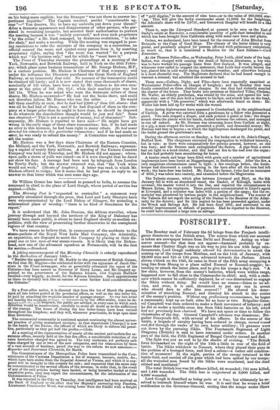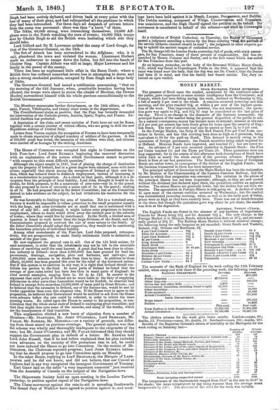POSTSCRIPT.
SATURDAY.
The Bombay mail of February the 3d brings from the Punjaub intelli- gence disastrous to the British arms. The source from which our account is taken are newspaper letters from Delhi and Bombay. Acting on what- soever counsel—for that does not appear—hastened probably by ru- mours that Chnttur Singh was on his way to join his son with large rein- forcements, Lord Gough suddenly altered his determination to await the coming up of the troops from Monitan, and on the 11th of January, with 22,000 men and 125 or 130 guns, advanced towards the Jhelum. About eleven o'clock on the 13th, he came in front of the Sikh army occupying a long line from Moong to a place called Russool or Russool-nuggur; in- tending to attack the latter place, and to give his troops a day's rest. "A few shots, however, from the enemy's batteries, which were within range, happened now to fall close to the Commander-in-chief; and, with a rash- ness which cannot be sufficiently deplored, he at once determined to engage the Sikhs without delay. He would hear no reason—listen to no ad- vice, and even, it is said, threatened to put any one in arrest who should dare to offer him counsel!" He altered his deter- mination of attacking Rnssool, and directed his attack to the centre of the enemy's position. Without any preliminary reconnoisance, he began a cannonade; kept up on both sides for an hour or two. Brigadier-Gene- ral Campbell was then ordered to make a flank movement of infantry; and he did so tinder a terrible cross fire from Sikh batteries on his left, which had not previously been observed. We have not space or time to follow the vicissitudes of the day. General Campbell's advance was disastrous; Bri- gadier Penuycuik fell, with several of his officers. In the course of the battle, a brigade of cavalry having been ordered to charge, turned round and fled through the ranks of its own horse artillery; 73 gunners were cut down by the pursuing Sikhs. The Fourteenth Regiment of Light Dragoons (British) is said to have retreated under orders. In another part of the field, the Fifth Regiment of Bengal Cavalry turned and fled. • The fight was put an end to by the shades of evening. " The British force bivouacked on the night of the 13th a little in rear of the field of battle. The Sikhs withdrew to Nilsson, where they placed their guns in the position of a besieged force, and fired a salute—a rather odd combina- tion of measures! In the night, parties of the enemy returned to the battle-field, and carried off the guns which had been spiked by our troops: all the wounded men found by the Sikhs were murdered, and the dead robbed and mutilated."
The total British loss was 26 officers killed, 66 wounded; 731 men killed, and 1,446 wounded. The Sikh loss is conjectured at 3,000 killed, and 4,000 wounded.
Lord Gough is described as being guile at a loss; but ultimately he re- solved to intrench himself where he was. It is said that be wrote a brief notification to the Governor-General, stating that the troops under Shere
Singh had been entirely defeated, and driven back at every point with the loss of many of their guns, and had relinquished all the positions in which they had been intrenched. For three days all despatch of private letters from the camp was prevented: there was then " a burst " of them.
The Sikhs, 60,000 strong, were intrenching themselves; 10,000 Aff- ghans were in the North watching the turn of events; 10,000 Sikh troops sent by Gholab Singh to aid the British were hesitating which side they should take.
Lord Gifford and Sir H. Lawrence quitted the camp of Lord Gough, for that of the Governor-General, on the 18th.
The fort of Attock has been surrendered to the Affghans; who, it is said, plundered the town and violated the women. Lieutenant Herbert made an endeavour to escape down the Indus, but fell into the hands of Chuttnr Sing. Captain Abbott was still at large; Major Lawrence and his family in the power of the enemy.
There has been an unpleasant little affair in the Bares Donb; where a British force has suffered somewhat severe loss in attempting to storm and take a strong stockaded position, occupied by Ram Singh and a large body of Sikhs..
The Governor-General had issued a notification announcing, " that on the morning of the 22d January, when, practicable breaches having been effected, the troops were about to storm the citadel of Mooltan, the Dewan Moolraj surrendered himself with his whole garrison unconditionally to the British Government."



























 Previous page
Previous page